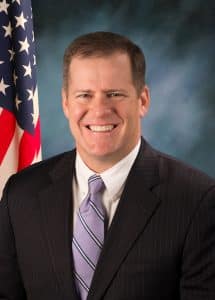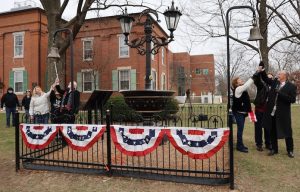Schimpf reviews historic session

State Sen. Paul Schimpf (R-Waterloo) recently took stock of the historic legislative session that concluded in Springfield on June 2.
In a session that saw the General Assembly raise the minimum wage, OK a constitutional amendment, legalize recreational marijuana and approve a capital plan, among other monumental measures, Schimpf also had some successes.
Those included passing bills that allowed Illinois to recognize out-of-state realtor and nursing licenses for spouses of military members, exempted the World Shooting and Recreational Complex in Sparta from certain gun control measures and extended youth hunting.
“Youth and apprentice hunting programs have proven to increase participation and help grow the next generation of hunters,” Schimpf said of that last law. “A strong field of hunters is essential for maintaining the state deer herd at appropriate levels and is a major economic engine for Illinois.”
Schimpf also helped pass resolutions that should make it easier for college students to transfer credits between institutions and extended the deadline for the Southwest Illinois Connector Task Force to complete its work.
The task force is studying the cost, feasibility, economic impact, funding options and environmental impact of a four-lane highway from Waterloo to Murphysboro.
Schimpf worked with new state Rep. Nathan Reitz (D-Steeleville) on both the youth hunting and task force legislation.
Although Schimpf was able to get those measures passed, he had several bills that did not pass.
One such piece of legislation would have made it easier for the Kaskaskia Regional Port District to compete for more grants.
It passed the Senate but stalled in the House.
“I think that was something hat, had (former state representative) Jerry (Costello II) not resigned, he would have been able to get through,” Schimpf noted. “I’ll make another run at that.”
Several bills aimed at reforming state government gained even less traction, including proposals to make the governorship one six-year term and eliminate the possibility of a budget impasse by automatically freezing discretionary spending levels if a new budget is not passed by May 31.
“I wasn’t really expecting those to pass,” Schimpf explained. “A lot of the time, when you’re talking about a proposed reform, you’re looking at years before it can get enough support. But I wanted to at least start the conversation on those.”
Schimpf said the reform the state needs most is one that would required a 72-hour cooling-off period between the second and final vote on budget bills.
“The end of this session really illustrates the need for that cooling off period because it was even worse this year in terms of you had elected officials voting on stuff, and they didn’t know what was in the bills they were voting on,” Schimpf said.
The budget bill was introduced less than 12 hours before the session was scheduled to end.
Another reform Schimpf tried to pass was one that would eliminate the sales tax on gasoline in the state.
He said he wanted to do that because Illinois charges a tax on both the fuel itself and the sale.
“I have a moral problem with charging tax on tax,” he said.
In part because that provision was not included in the $45 billion capital plan that the legislature passed, Schimpf did not vote for it.
He also did not vote for the state’s $40 billion budget.
He voted for a budget he did not like last year, but he said it was better than another budget impasse.
“In many ways, the budget this year is better than last year’s was,” Schimpf noted. “With that being said, it still doesn’t do anything to solve our long-term problems. You could argue it makes it worse… we increased spending across the board, which is going to make it more difficult to handle our long-term financial challenges.”
In a win for Republicans, Schimpf highlighted the failure of a bill that would have required citizens to get fingerprinted and pay a higher fee before obtaining a Firearm Owners Identification Card.
Overall, with several high-profile measures like the budget and capital plan passing without his approval, Schimpf said the session was what he expected.
“I was disappointed but not surprised by the outcome,” he said. “After the last election, the Democrats have complete control of Illinois government. Gov. Pritzker, by and large, did everything he promised he was going to do. He had the power to do that, and the Republicans didn’t really have any ability to stop him.”






